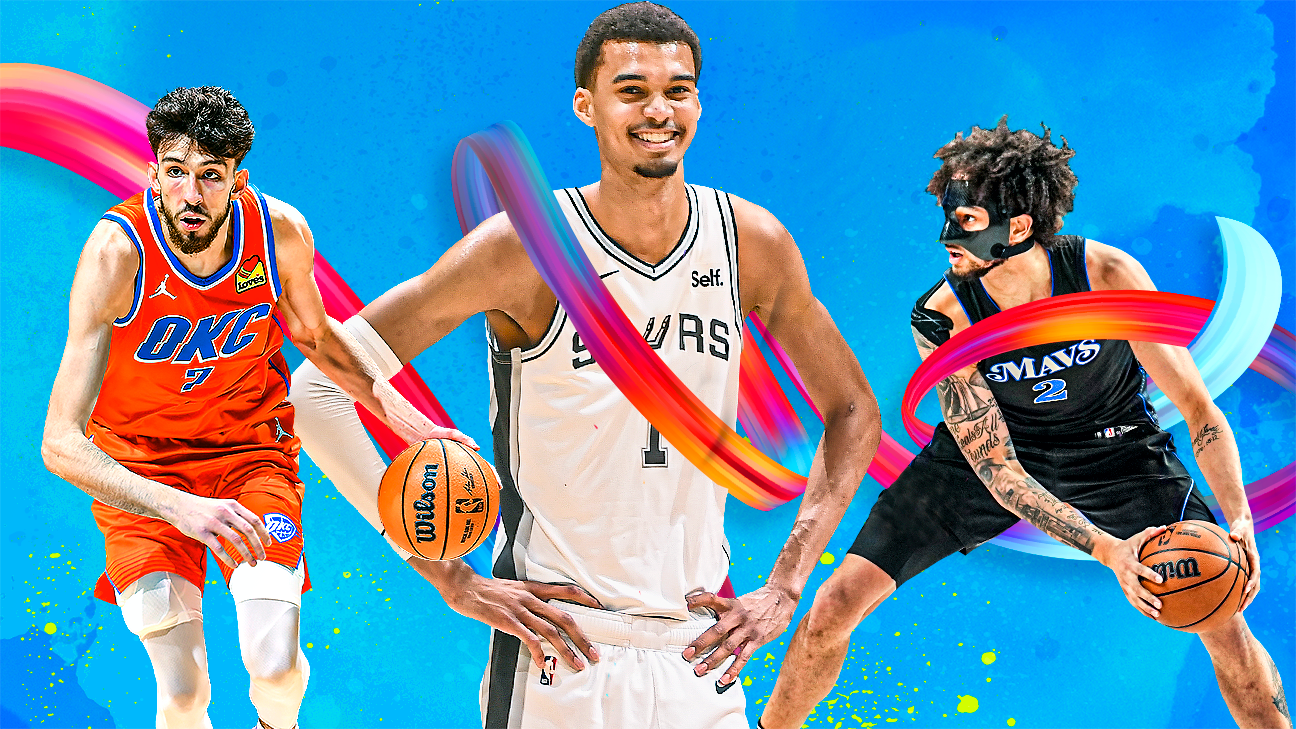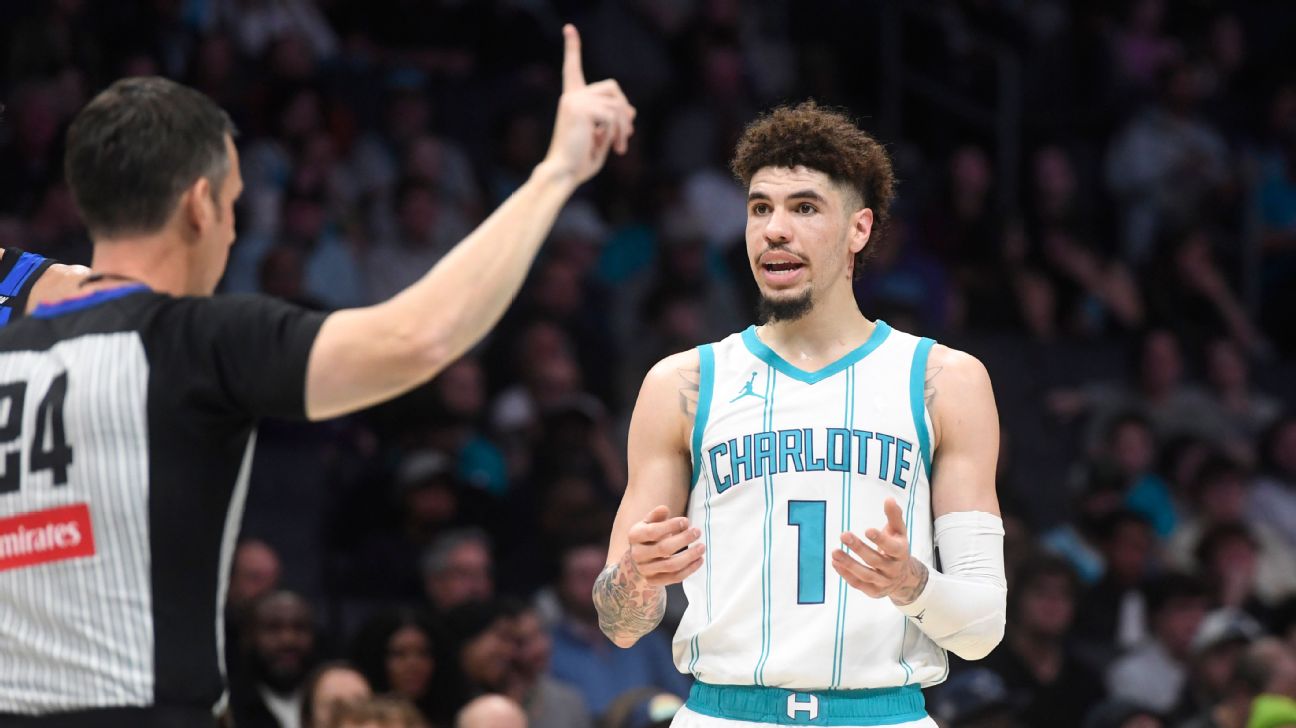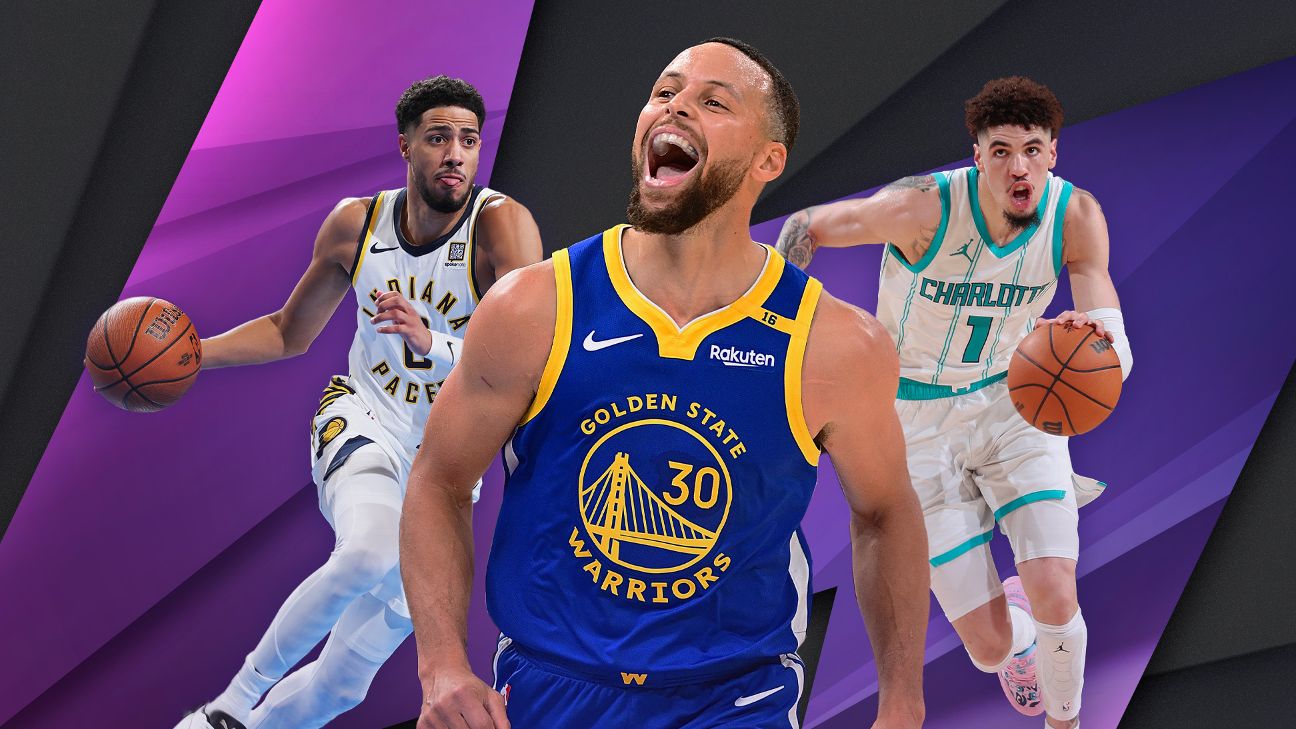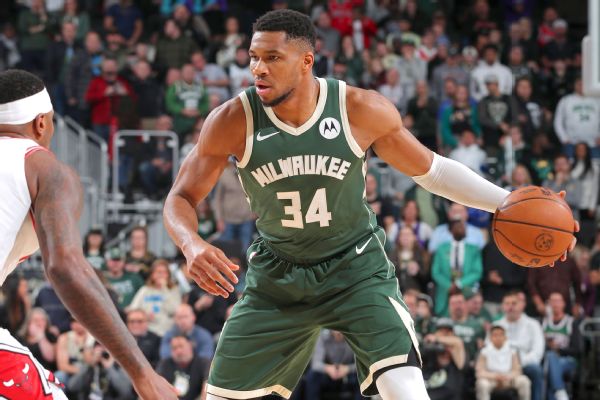ESPN
There is less than a month left in the 2023-24 regular season, and the rookie of the year race appears to be coming closer to a conclusion. No. 1 overall pick Victor Wembanyama is the favorite at ESPN Bet and is in line to become the first rookie to lead the league in blocks since Manute Bol in 1985-86. He’s also fast approaching the 65-game minimum to earn consideration for All-NBA and All-Defensive teams.
Meanwhile, Chet Holmgren, the No. 2 overall pick in 2022, has yet to miss a game this season. And while he’s fallen behind Wembanyama in the rookie of the year race — and our rankings — his season will extend beyond Wembanyama’s as the Oklahoma City Thunder battle for the top seed in the Western Conference playoffs.
All season, ESPN’s Bobby Marks and Kevin Pelton will be checking in on first-year players — including Holmgren, who is eligible for rookie of the year after missing his first season in the NBA because of injury — and ranking their top 10.
1.
Marks: Victor Wembanyama, San Antonio Spurs
This is not to say the rookie of the year race between Wembanyama and Holmgren is over, but it is time to start putting Wembanyama in the All-NBA and All-Defensive discussion. The No. 1 overall pick is on pace to meet the 65-game criteria, making him eligible for both award. His accomplishments since the All-Star break are All-NBA caliber, even though the Spurs are still in the Western Conference basement. In his past 13 games, Wembanyama is averaging 22.8 points, 11.8 rebounds, 4.8 assists, 1.8 steals and 4.9 blocks, while shooting 48% overall and 36% from 3-point range. Wembanyama could benefit from the 65-game rule making players like Joel Embiid, Donovan Mitchell, Jimmy Butler, Jamal Murray, Karl-Anthony Towns and Trae Young ineligible to be named All-NBA. However, another new rule could hurt him: The NBA made All-NBA positionless this season. In the past, he would’ve had a strong case as the third-team center. Now he’ll have to be judged as one of the top 15 overall players this season.
Pelton: Wembanyama
If we were doing an NBArank exercise right now, Wembanyama has a credible argument to rank in the top 15. However, the combination of Wembanyama adjusting to a new league as a teenager at the start of the season and the Spurs figuring out how to use him — as a center, and with Tre Jones at point guard to get him in more favorable spots — means I think we have to draw a distinction between Wemby’s full season and the level at which he’s currently playing.
Over the course of the season, Wembanyama hasn’t been a top-15 player. His poor efficiency as a scorer playing primarily at power forward (43% from the field, 26.5% on 3s through Dec. 6, his last start alongside Zach Collins) might prevent Wembanyama from pushing for All-NBA. The fact that we can even mention that possibility is remarkable, however. Fellow Spurs No. 1 picks Tim Duncan and David Robinson are the lone two rookie All-NBA picks in the past 39 years, and both arrived with four years of college experience (and at age 24 in the case of Robinson, following two years of Naval service).
2.
Pelton: Chet Holmgren, Oklahoma City Thunder
Given the pessimism about the 2024 draft, should we maybe consider taking away the rookie of the year trophy from next year’s class and giving out two this year? Holmgren has produced more wins above replacement player (WARP) by my metric than any rookie since Luka Doncic in 2018-19, yet his hope of winning rookie of the year has faded as Wembanyama has surged.
Atypically for a star rookie, Holmgren will have the opportunity to make a significant impact in the playoffs with the Thunder battling for the top seed in the Western Conference. Just one of the last five rookie of the year winners has even reached the playoffs: Scottie Barnes, whose Toronto Raptors were eliminated in the opening round.
Marks: Holmgren
Holmgren is on pace to become only the fifth rookie since the 2018-19 season to play in all 82 games, joining Tari Eason, Mikal Bridges, Shai Gilgeous-Alexander and Collin Sexton (it should be noted that two seasons in that span consisted of less than 82 games due to the COVID-19 pandemic). Holmgren’s durability this season is remarkable, especially because he missed last season because of a broken foot. “I mean, I missed so many games last year and I had to sit at the end of the bench or behind the bench so many times last year, I vowed to myself if I can physically go out there and play … and I feel like I can help our team in any way win, I’m going to go do that,” Holmgren said recently on The Woj Pod. “You can let me die out there or wheel me off the floor in a wheelchair, but I am going to go out there and play if I can.”
Holmgren became the first player in NBA history to record 150 assists, 150 blocks and 100 3-pointers in the same season (Wembanyama soon joined him in that club). One area of minor concern is Holmgren’s 3-point shooting and blocks slipping. In a seven-game stretch at the end of February and beginning of March, Holmgren shot 22% from 3-point range and blocked 8 shots total, well under his season average.
3.
Marks: Dereck Lively II, Dallas Mavericks
Give head coach Jason Kidd credit for balancing the playing time between Lively and newcomer Daniel Gafford. In Dallas’ March 11 win at Chicago, the pair became the first teammates to record 20 points on 90% shooting in the same game since 2008, per ESPN Stats & Information. What was more impressive, however, was the impact Lively had in the Mavericks’ win against the Miami Heat a week earlier. While he scored only four points, Lively held Bam Adebayo to 1-of-4 from the field and grabbed two big offensive rebounds late in the game. He is shooting a scorching 81.7% from the field since All-Star break.
Pelton: Lively
Given Gafford’s historic streak of 33 consecutive made shots that ended last week, it’s remarkable that Lively has been nearly as efficient in that span, maintaining even playing time with the veteran the Mavericks gave up a first-round swap to acquire. Since the All-Star break, Lively is averaging 19.1 minutes per game and Gafford 19.0. One concern for Lively is his foul shooting, particularly as we look ahead to the postseason. Since hitting 64% of his free throws in October and November, Lively is at 48% from the line, which could make him a target for intentional fouls.
4.
Marks: Brandin Podziemski, Golden State Warriors
The Warriors’ win against the Spurs on March 11 was the first game Podziemski came off the bench since Valentine’s Day. He continues to make an impact despite shooting 38.5% from the field and 35.9% on 3-pointers since the All-Star break. In the win versus the Spurs, Podziemski had 8 rebounds, 4 assists, a steal and block. One of those rebounds set up a Klay Thompson 3, putting Golden State up by one. “He’s got great instincts for the game,” Warriors coach Steve Kerr said in late February. “He’s got a knack for being in the right place at the right time in terms of rebounding passing lanes, loose balls, all that stuff.” The 6-foot-4 guard has six games of 6 or more rebounds and eight games of at least 4 assists since Feb. 22.
Pelton: Podziemski
The one factor in Podziemski’s value that remains constant even when his shooting fluctuates is drawing charges. Podziemski has drawn 33 this season to lead the league, per NBA Advanced Stats. No other rookie has taken more than 13 charges (Portland’s Toumani Camara). That’s one reason the Warriors outscore opponents by 6.6 points per 100 possessions with Podziemski on the court, far and away the best mark for any rotation player.
5.
Marks: Jaime Jaquez Jr., Miami Heat
Jaquez rebounded from a left groin injury and hitting the proverbial rookie wall in late January and early February. In the second game back after the All-Star Game, he scored 26 points as the short-handed Heat won on the road at Sacramento. He followed up the Kings game a week later with 25 points in a loss to the Thunder. Jaquez is shooting 49% from the field this season, and a big reason why is his effectiveness in the post. He is averaging 1.35 points per direct post up this season (on 84 postups), second best among players (trailing only Kristaps Porzingis) with at least 75 postups per Second Spectrum.
Pelton: Brandon Miller, Charlotte Hornets
Among the three rookies tasked with playing high-usage roles as starters — not coincidentally, the draft’s top three picks — Miller has been somewhat closer to Wembanyama in terms of efficiency (.541 true shooting percentage on 23.5% usage) than No. 3 pick Scoot Henderson (.481 true shooting on 25.5% usage). LaMelo Ball’s injury has likely forced the Hornets to heap more responsibility on Miller than they expected. Remember, he came off the bench the season’s first five games. It will be a long time before that happens again.
6.
Marks: Miller
Miller should be in the top five based on numbers alone. He has eight 25-point games, scored in double digits 23 straight games (snapped on March 16) and leads all rookies in 3-pointers made. His 46% shooting off the dribble jumpers this season ranks in the top-11 among all players with at least 200 attempts per Second Spectrum. But since the break, Miller has attempted only 21 free throws in 13 games and while his field goal attempts have increased (16.2 per game in the past 13 games), his efficiency has declined. Since the break, Miller is shooting 41.0% from the field and 30.5% on 3-pointers.
Pelton: Jaquez
Jaquez’s injury limited his minutes and his shooting slumped to 45% from the field and 20% on 3s in February, easily his lowest marks in any month to date. He averaged just 10.1 PPG in the month — down from at least 12.6 PPG each of the three previous months. As Bobby notes, Jaquez has bounced back with a strong March thus far. With the Heat playing meaningful games as they look to avoid the play-in tournament, Jaquez still has a chance to play his way back in the top five.
7.
Marks: Williams and Josh Giddey. Offensively, Wallace scored a career high 22 points against the Memphis Grizzlies on March 10 and ranks second among all rookies in 3-point percentage (42.6%) this season. In seven games in which he’s played more than 25 minutes, Wallace is shooting a blistering 58.3% from the field, 57.1% on 3-pointers and averaging 11.3 points.
Pelton: Wallace
We keep waiting for Wallace’s 3-point shooting to regress toward what we saw last year at Kentucky (35%). Instead, after a down December (31%) that seemed to indicate Wallace’s strong start was fading, he’s hit 42% so far in the 2024 portion of the schedule. Add in Wallace’s strong on-ball defense and he’s yet another rookie who will be playing a key role for the Thunder in the playoffs.
8.
Marks: Keyonte George, Utah Jazz
George put together one of the great seven-minute stretches of any rookie this season in Utah’s loss to Boston on March 12. He scored 14 points, including three 3-pointers and had a highlight chase down block. George became the first Jazz rookie with 25 points and 5 assists in consecutive games. Since returning to the starting lineup post All-Star break, he has averaged 18.5 points, 5.0 assists and shot 38.0% on 3-pointers. His nine 3-pointers Feb. 15 tied the NBA rookie record.
Pelton: Amen Thompson, Houston Rockets
Although his brother Ausar made a more immediate impact as a starter in Detroit, it’s Amen who’s filling up box scores more on a per-minute basis, averaging a double-double (14.7 points and 10.3 rebounds) per 36 minutes along with 4.2 assists, 2.2 steals and 1.2 blocks. Credit coach Ime Udoka with putting Thompson in position to succeed despite his non-shooting (16% on 3s). Frequently playing in the dunker spot on offense, Thompson is making 60% of his 2-point attempts.
9.
Pelton: Ausar Thompson, Detroit Pistons
Back in the starting lineup since the trade deadline, Thompson is making an impact with his perimeter defense and activity. The Pistons allow 7.6 fewer points per 100 possessions with Thompson on the court, according to NBA Advanced Stats, offsetting the issues Thompson’s shooting creates on offense. There are signs of progress there. Thompson has made multiple 3s in three games since the All-Star break after doing so just twice beforehand.
Marks: Cam Whitmore, Houston Rockets
In addition to losing Alperen Sengun for an extended period of time, the Rockets will be without Whitmore for a minimum of three weeks because of a sprained LCL in his right knee. Before the injury, Whitmore had begun to cool off from deep, shooting 26% on 3-pointers since the All-Star break. If his season does end prematurely because of the injury, Whitmore’s first year should be described as a success. He slid to the 20th pick last June (after many projected him to go in the lottery) and spent the first two months out of the rotation, but now should be considered for All-Rookie honors. He ranks seventh in points per game among all rookies since Christmas.
10.
Marks: Amen Thompson
You could have flipped a coin between Thompson and Trayce Jackson-Davis for the last spot. Jackson-Davis went from out of the rotation in early February to averaging 17.9 minutes, 9.2 points, 5.2 rebounds since the All-Star break. Meanwhile, Thompson continues to make an impact defensively. He has 16 blocks since the All-Star Game, including a career high 5 against Portland on March 10. Since January 1, Thompson is one of four players with 25 blocks and 50 steals, along with Alex Caruso, Kawhi Leonard and Gilgeous-Alexander.
Pelton: Trayce Jackson-Davis, Golden State Warriors
Consider Jackson-Davis and Podziemski (along with Jonathan Kuminga) a good reminder that draft picks aren’t only important to veteran teams because of their small salaries. It’s also important to inject a dose of athleticism and energy alongside aging players, which explains why Jackson-Davis has edged Kevon Looney and Dario Saric out of the rotation despite their superior experience and skill. In particular, Jackson-Davis’ above-the-rim finishing gives the Warriors a different dimension in pick-and-rolls. He’s shooting 71% from the field because of his ability to generate dunks from these plays and leads the team in blocks while ranking 11th in minutes.
More rookie notes:
-
Before Jan. 20, Raptors guard Gradey Dick was averaging 12.3 minutes per game and was not part of the rotation. Since then, Dick has averaged 9.7 points and is shooting 40% on 3-pointers. He ranks in the top 10 in catch-and-shoot 3-point field goal percentage since Feb. 5 among players with at least 75 attempts per Second Spectrum.
-
A pair of two-way players, Chicago Bulls forward Onuralp Bitim and Portland Trail Blazers center Duop Reath, had their contracts converted in mid-February. In his first game seeing extended minutes, Bitim scored 10 points in a win against the Cleveland Cavaliers. He scored a career-high 17 points in a loss to Dallas on March 11. Reath had five straight double-figure games from March 1 to March 8. Included was a career-high 26 points in a loss to the Minnesota Timberwolves.
-
Taylor Hendricks was moved into the Jazz starting lineup after the All-Star break. Before spraining his left toe March 4, Hendricks was averaging 8.3 points, 6.4 rebounds, shooting 54.8% from the field and 39% on 3-pointers. His teammate and fellow rookie Brice Sensabaugh started the two games Hendricks missed, shooting 12-of-19 from the field and averaging 15.5 points.
-
Charlotte Hornets guard Vasilije Micic had one of the most efficient games of any rookie this season. The 30-year-old shot 9-of-10 from the field, 5-of-6 from 3, scoring 25 points and handing out 8 assists. Since being traded from Oklahoma City, Micic leads all rookies in assists. Charlotte is 7-10 with Micic in the lineup.
-
Consistency remains the big factor on why GG Jackson has not cracked the top 10. In his past three games, Jackson is averaging 25 points and shooting 48% from the field. In the seven games prior, he averaged 12.4 points and shot 31% from 3.



